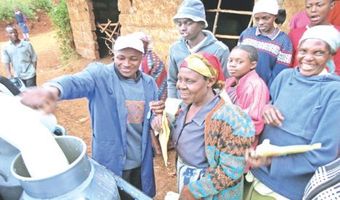 Milk farmers delivering their milk at a collection centre. New KCC is upgrading its processing factories countrywide to speed milk processing.
Milk farmers delivering their milk at a collection centre. New KCC is upgrading its processing factories countrywide to speed milk processing.
New Kenya Cooperative Creameries (KCC) has commissioned a Sh1.5 billion programme to increase its plant processing capacity to 1.5m litres of milk a day from about half a million a day which will see about three million dairy farmers earn 72 per cent pay rise from Sh2.5bn in the previous years to Sh4.5m.
The upgrade comprises the migration from the High Density Polyethylene technology to Poly Ethylene Terephthalate in packing of milk products which is going to enable long-life production of milk products to suit both local and international markets.
“The upgrade process that has begun with our Eldoret factory with the commissioning of an ultra-modern UHT processing unit to increase the production of longer shelf-life products for the local and export markets,” said New KCC Managing Director Nixon Sigei.
RELATED ARTICLE: Milk processing plant takes urban dwellers back to farms
“This is our countrywide plan that involves upgrading of the firm’s filling and packaging facilities to ensure quality products using the latest technology.”
In the upgrade plan, Eldoret and Nyahururu factories will be the first prioritized factories as most dairy afrmers come from these regions. The second in line will be Dandora and Sotik followed by Kiganjo, Kitale and Miritini.
The modernisation will also enable the cooperation produce other milk products such as yoghurt, fermented milk and creams among other produce.
“The plant will more than double its processing capacity for its fermented milk products category of Mala and yoghurt whose demand in the market has continued to grow,” he told Saturday Standard.
“The upgrade will also expand and modernise the butter and fresh milk categories with an overall improvement of production efficiency at the facility.”
RELATED ARTICLE: Milk hawking lifts farmers’ prospects and economy
Sigei hopes this will up milk production which dropped by 17.5 per cent in the first five months of 2017. The drop forced the government to allow tax-exempt milk powder imports to stabilise prices.
A report by the Kenya National Bureau of Statistics indicates 215.9 million litres were sold to processors between January and May compared to 261.9 million litres in a similar period last year.
The report adds that April and May were the hardest hit months with 37.7 million and 36.9 million litres sold respectively, compared to 54.4 million litres and 49.5 million litres in a similar period last year.
RELATED ARTICLE: County counts on reduced AI costs to bolster milk production
KCC has been losing her customers (dairy farmers) to other buyers like milk ATMS. Currently there are 275 milk ATMS with 62 per cent located in Nairobi alone.
There are slightly over three million dairy cattle in Kenya who contribute 4.5 per cent to the coutry’s GDP and it is a source of livelihood to over 1.5m smallholder households.
















Comments powered by CComment